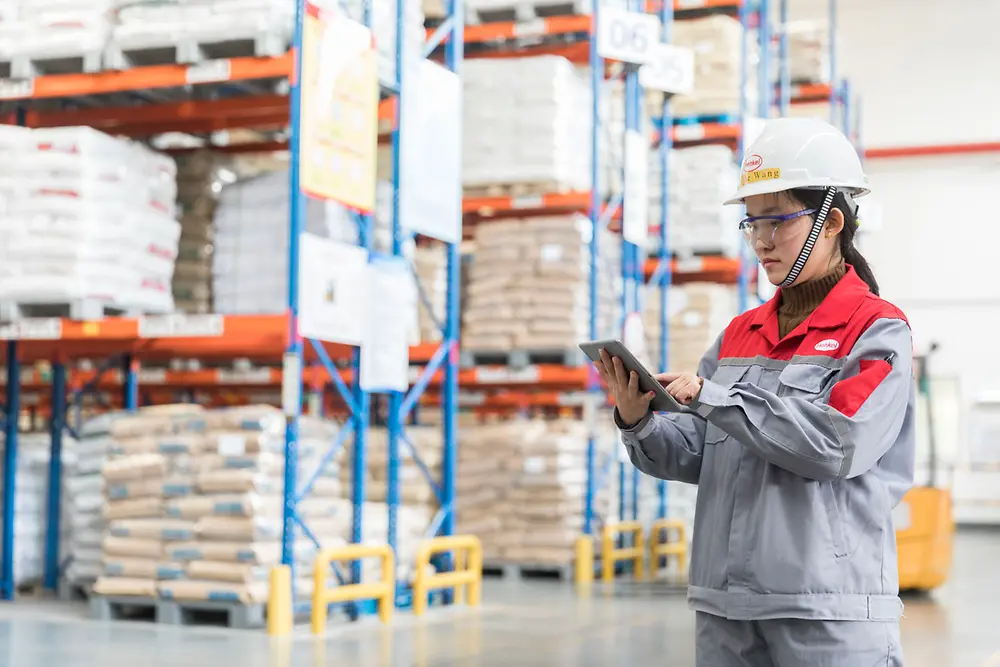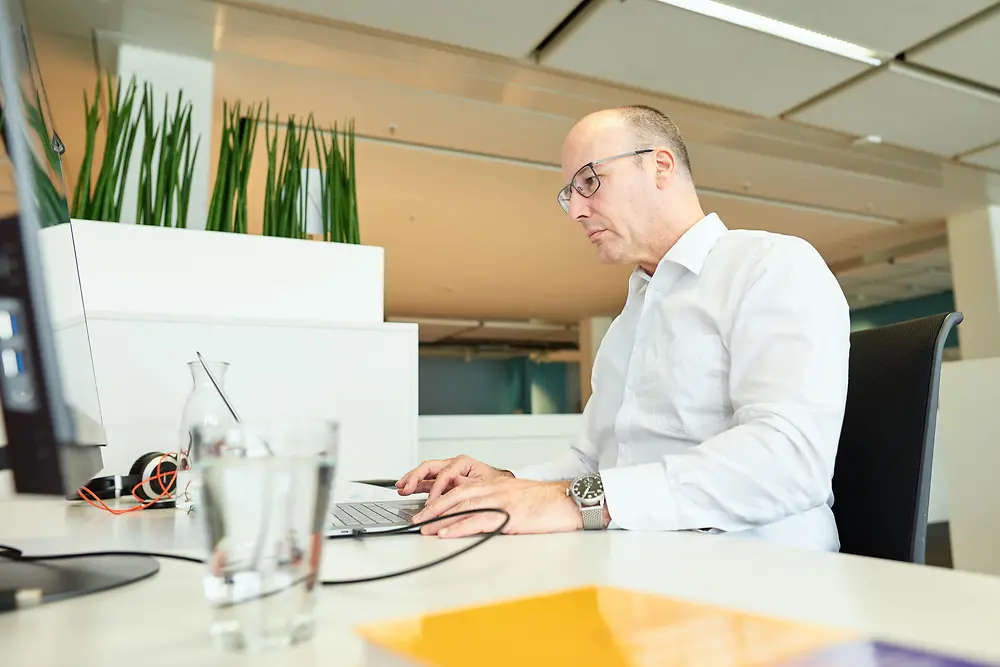Discover the brands and technologies from our business units Henkel Adhesive Technologies and Henkel Consumer Brands.
Smart processes, better decisions
“From the time the idea first emerged, it took a while before we were able to integrate the shuttle into live operations,” says Andreas Nover. As a production engineer, he is responsible for investment projects and technical support in liquids production in Düsseldorf. Many tests had to be carried out before the self-driving forklift met the relevant security standards to not representing a threat for people or other machines. It now goes back and forth between the different stations, also on weekends and during the night. It navigates across the production hall over at least three local “satellite points”. Sensors identify obstacles early and make sure that the shuttle moves at a safe distance from people within its assigned area.
Machines adapt to each other
Nover is proud of the fact that Henkel uses technologies like the pallet shuttle. “Industry 4.0 makes people’s lives easier: mainly by making production more ergonomic, but also at the interfaces between man and machine. The machines relieve us of hard manual or monotonous tasks, such as driving the same short distance around the clock,” he explains. When Nover started his apprenticeship as an electrician at Henkel in 1992, machines could complete simple individual actions like screwing on bottle tops – but they were not intelligent. Nover specialized in automation as early as the 1990s, so he witnessed their evolution first-hand. “The breakthrough happened about 15 years ago, with the introduction on a large scale of intelligently steered robot technology and the first signal connections between the different sections of a bottling line. Since then, our production units have become increasingly interconnected. Nowadays, they can communicate with each other. Individual machines know how fast the others are working and are capable of adapting to that,” says Nover.
"Industry 4.0 makes people’s lives easier: mainly by making production more ergonomic, but also at the interfaces between man and machine."
Andreas Nover, production engineer
In the company’s Laundry & Home Care business unit, the 30 production sites and its processes worldwide are all connected – information is collected centrally in real time. The digital platform “Wonderware” is the digital backbone of industry 4.0. Since 2013, all the data from every laundry detergent production site’s online metering system has been collected and processed there. It records how much energy or water each plant consumes and also displays this information visually – as bar diagrams, for example, or using a traffic-light system. Thanks to its analytical capabilities, the system can recognize patterns and identify potential for optimization. Since 2016, the process has gone one step further, as efficiency data from the production lines is also fed into the system and analyzed. Nover and his colleagues can view the relevant information for all the production sites worldwide and implement any measures necessary to improve the production flow. For example, they can see where resources can be saved in standby mode or which units are responsible when a line stalls.
“In industry 4.0, we have more data – but not automatically more information,” says Dirk Holbach, Corporate Senior Vice President Supply Chain for Laundry & Home Care. Henkel started automating its processes and organizing the data stream early on. As a result, the company is well positioned in the international competition. “Technologies like the AGV have been around and ready to be used for a long time. However, we can only start deploying them when they become economically viable and people accept them. It’s important to us to recognize and seize opportunities,” says Holbach.
Test, learn, optimize
To that end, Henkel is always testing new ideas in pilot projects. The labeling cameras in laundry detergent production in Düsseldorf also started with a trial run in 2013. Nover’s team tried using digital images to improve the application of labels on laundry detergent bottles. The cameras photograph the front and back labels of each bottle. Based on a given standard, the system then checks whether the labels have been applied in the correct place, without forming bubbles or creases. If a label finds itself outside of the tolerance range, the system automatically separates the bottle out from the rest – and it does this up to 250 times per minute, because that’s how fast the lines move. On a screen, the employee can monitor whether errors are registered more frequently at a particular station on the production line, and make any necessary improvements. The system has proven effective, as employees can now identify labeling problems faster and more easily than before. More than 50 production lines for laundry detergents and cleaning products have since been equipped with these cameras worldwide. This data is also collected on the central platform in real time.
Dirk Holbach and his team in Amsterdam decide which ideas Henkel should pursue and implement as pilot projects. Supply chain experts from the company’s three business units come together to share ideas there and develop the corporate agenda for industry 4.0 with colleagues from IT and Finance. “We get better results more quickly with local tests on a small scale. When something doesn’t work, we can react immediately,” says Holbach. Laundry & Home Care is currently leading more than 20 of these trials at 10 different locations, each of which is being implemented in under 12 months. The motto for these agile processes is, “Try small, fail small, scale up fast.”
Henkel has defined focus topics for the rollout of industry 4.0, which are carried across all business units by the team in Amsterdam. New approaches for demand planning and forecasting are just one of many examples, and will allow the company to predict and plan for future needs even more effectively going forward. Indeed, combining artificial intelligence with big data makes it possible to predict where customers and consumers will display increased demand for which products in the future.
Whenever a technology has proven useful and is due to be rolled out to other locations, Nover is informed. Ever since Henkel centralized its planning for the global supply chains in Amsterdam, there’s always a lot to discuss. Nover coordinates with his colleagues in the Netherlands and around the world several times a week. The system improves transparency: When Nover observes that his production line’s energy needs rise above the average values, for example, he compares the data with that of other locations. “Then I enquire with colleagues who have had similar experiences, so we can solve the problem together,” he says. “And when a new technology that has proven valuable at our site is due to be deployed at another location, I’m happy to provide guidance, of course.”
“We get better results more quickly with local tests on a small scale. When something doesn’t work, we can react immediately.”
Dirk Holbach, Corporate Senior Vice President Supply Chain for Laundry & Home Care
















